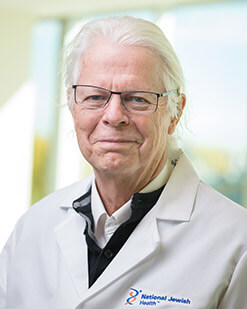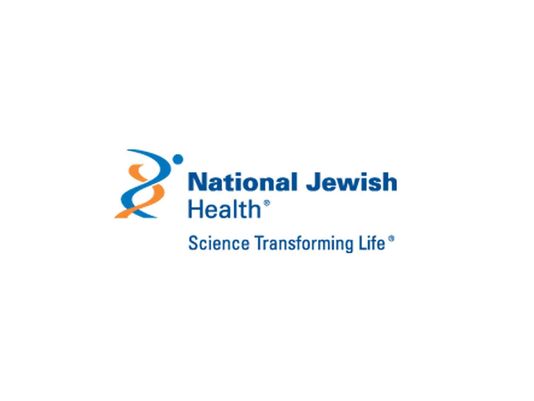Translating fundamental research to treatments for autoimmune diseases and cancer
Many of the most common autoimmune diseases result from T cell attacks via self-antigens expressed in specific organs. Likewise, in many cancers, it is common to identify T cells that recognize self-antigens over-expressed in tumor cells. Therefore, understanding the biological mechanisms that determine how self-peptide/MHC complexes drive the immune response of T cells, may help to uncover therapeutics for treating these devastating diseases. Dr. John Kappler, Distinguished Professor for National Jewish Health and the University of Colorado, Denver, studies the way in which T cells recognize self-antigens in order to translate fundamental research into translational projects that identify how T cells participate in a number of diseases. His knowledge and experience with how peptide and MHC complexes drive the immune response of T cells, allow him and his team to design novel ways to harness the immune system in the treatment of autoimmune diseases and cancer.
Recently awarded the Wolf Award alongside his wife and long term collaborator, Dr. Kappler is a leader in the field having contributed to seminal knowledge about T cells and the immune system. With over thirty years of experience in studying T cell receptor and MHC-peptide structure and function, Dr. Kappler and his team have accumulated a wide set of tools that allow them to address any aspect of this area -- all the way from the in vivo immune responses to the atomic x-ray structures of T cell receptors and MHC/peptide complexes. Their groundbreaking findings, including the discovery of the nature of T cell antigen receptor, the role of antigen processing in generating the peptides required for creating MHC/peptide complexes, and the phenomenon of thymic elimination of self-reactive T cells during T cell development, have helped them to develop tools that are now commonly used around the world to study these molecules. Thus, Dr. Kappler’s projects have taught the scientific community that the T cell branch of the immune system is exquisitely able to detect and respond to slight variants of self-antigens and that this knowledge can be used to develop strategies either to prevent or provoke immune responses to self-antigens.
Current research includes:
-
Type-1 Diabetes (T1D): T1D is an autoimmune disease in which T cells infiltrate the pancreas and destroy the beta cells that produce insulin. Exactly how peptides from these proteins bind to self MHC, and why these peptide-MHC complexes do not eliminate the self-reactive T cells during thymic development has remained a mystery. Dr. Kappler and his team have identified the pathogenic peptides and shown that they bind very poorly to the relevant MHC molecules unless they have been chemically modified in a process that is unique to the pancreas. T cells specific for these peptides fail to find these peptide-MHC complexes in the thymus. They escape to encounter the modified self-peptides bound to MHC for the first time in the pancreas, thus initiating disease. Recently Dr. Kappler and his collaborators have been accumulating evidence that the same process occurs in the human disease that they have previously observed mouse models. His work has pointed to the possibility of prevention or treatment based on self-antigen therapy.
-
Cancer Vaccines: The prospect of using the body’s immune system to fight cancer, first envisioned many decades ago, has been an elusive goal. In collaboration with others Dr. Kappler has taken the approach of creating a vaccine using a modified version of the tumor antigenic peptide that is much more effective than the natural one in eliciting an immune response from these T cells, driving them to a highly active differentiation state. These fully activated T cells can now destroy the tumor cells that express only the natural, unmodified tumor antigen. He and his team worked out the general principles for this approach in a mouse tumor model and are now involved in a multi-center program attempting to apply these methods to human lung and breast cancer. His work is not designed to replace any therapy, but by creating “super-agonist” peptides that strongly stimulate tumor specific T cells, he and his team hope to provide synergistic tools that can be combined with other therapies. The specific immune boosting effect of these peptides may mean that lower doses of the more toxic non-specific therapies can be used.
Bio
Dr. John Kappler was born and raised in Baltimore Maryland, and came of age during the 50’s and 60’s. As a child, he always had a curiosity about how things worked and an interest in math and science. He had the good fortune to attend high school at Baltimore Polytechnic Institute from 1957-61, one of the top public science high schools in the country, where he had a chance to learn calculus, analytical geometry, physics, chemistry and mechanics as well as woodworking, foundry, forge, metal working, surveying and mechanical drawing from a collection of extremely talented teachers. This set him firmly on the path for a career in science.
In 1961, he went to the Lehigh University as a chemical engineering major, but soon learned that his passion was going to be in laboratory research. Dr. Kappler was heavily influenced and mentored by Dr. Joseph Merkel who taught biochemistry at Lehigh and gave him a taste for experimental research. After graduating, he went to the fledgling Department of Biochemistry at Brandeis University in 1965 for his graduate work. It was there, under luminaries such as Nathan Kaplan, William Jencks, Robert Abrams and Gordon Sato, that he learned how to approach scientific problems experimentally and to be an independent thinker.
Dr. Kappler completed his postdoctoral work in immunology with Richard Dutton at the University of California, San Diego from 1970 to 1973. This was the beginning of the Golden Age of immunology, when most of the basic functions of the immune system were still not understood, especially those concerning the development and functions of the T cell branch of immunity. He met Philippa Marrack in the Dutton lab and together, in 1973, they went on to faculty positions at the University of Rochester and then in 1980 to their present location in Denver at National Jewish Health research hospital Denver. In Denver they raised their family and rode the ever expanding wave of basic immunology research over the next 20 years. Dr. Kappler and Dr. Marrack have made major contributions to the field, including the discovery of the nature of the T cell receptor for antigen and of the major mechanism that the immune system uses for eliminating self-reactive T cells during their development in the thymus, before they enter the functioning immune system. These accomplishments earned them election to the National Academy of Sciences and appointments as investigators in the Howard Hughes Medical Institute as well as numerous national and international awards.
During the mid-90’s, Dr. Kappler felt that it was time to take all of the knowledge and experience he had gathered in the basic biology of T cells and apply them to more translational problems. He began working on how T cell become involved in allergy, autoimmunity and cancer. He and his team now have had a number of successes in these areas and they are the main problems that he intends to work on in the future.
Throughout his career, Dr. Kappler has been driven by a curiosity for how things work. He is a scientist of “the old school”, meaning his research is guided by experimental testing of hypotheses formulated to explain biological phenomena. Even at this later stage of his career, he is still working at the bench, developing new hypotheses and bringing new technologies into his lab.
Aside from research, in his free time, Dr. Kappler enjoys playing and building guitars. His hobby dates back to being fifteen years old when he first began playing the guitar. While in the guitar shop one day for a repair on his own guitar, he met a master luthier, Edward Dick, who trained him to build guitars as well. Dr. Kappler now designs guitars for local musicians in the Denver area whom he admires.


